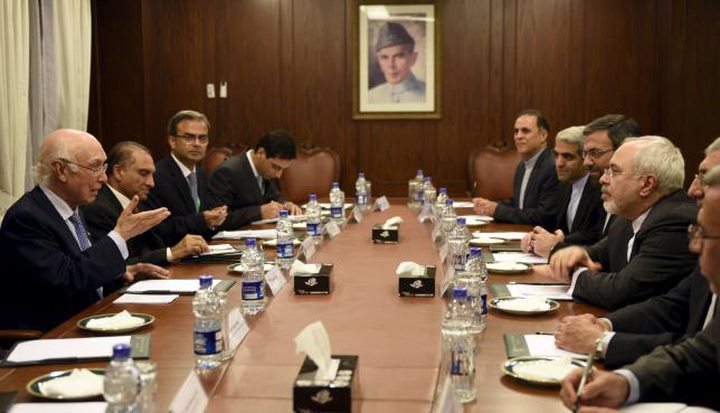Afghans, Pakistan Hold Firm on Ties; India 'Extends Hand' to Pakistan

Iranian Foreign Minister Javad Zarif (3rd R) meets with advisor to Pakistan's Prime Minister
The "Heart of Asia" meeting, an annual gathering of Asian and other countries to pledge support to Afghanistan, comes months after the first, inconclusive talks between the Afghan government and the Taliban.
Indian Foreign Minister Sushma Swaraj, also attending the conference in Islamabad, said she was extending India's hand to old rival Pakistan and both countries should show the maturity and confidence to improve ties.
U.S. Deputy Secretary of State Antony Blinken, also at the conference which began on Tuesday, has called for Pakistan to use its influence with the Afghan Taliban to push for Afghan reconciliation.
But hope for a resumption of Afghan talks appeared even more remote as Taliban militants and Afghan security forces battled at the airport in the southern city of Kandahar into a second day on Wednesday. At least 18 people had been killed, Afghan officials said.
Cooperation between Afghanistan and Pakistan is seen as essential for Afghan peace but hopes for ties after Afghan President Ashraf Ghani was inaugurated last year were quickly dashed, largely because of a series of bomb attacks in Kabul.
Ghani told the conference "enemies" had unsuccessfully tried to divide Afghanistan but they had been foiled. He blamed "regional and international terror groups" for the violence in his country.
"In the past, there has been the temptation to use non-state actors as instruments of foreign policy," he added, in a clear reference to Afghan assertions that Pakistan supports the Taliban to maintain influence in Afghanistan.
Pakistan denies that.
"I have had to become a war president, because an all-out war has been imposed on us," Ghani said.
'World waiting for change'
Pakistani Prime Minister Nawaz Sharif stressed his commitment to "an Afghan-led and Afghan-owned reconciliation process", a reference to the talks between the Afghan government and the Taliban, hosted by Pakistan, that foundered after one round in July after news leaked that Taliban founder Mullah Mohammad Omar had been dead for two years.
Omar's deputy, Mullah Akhtar Mansour, took over as leader but violent splits have emerged in the militant group.
Sharif also spoke of Pakistan's aim to repatriate the 2 million Afghan refugees in Pakistan, some of whom have been in Pakistan for decades.
"The massive cross-border movement of refugees constitutes a security risk," Sharif said.
In response, Ghani pointed out that an offensive by the Pakistani military against Pakistani Taliban has sent an influx of Pakistanis into Afghanistan.
"Unfortunately, recent events in Pakistan have forced us to host 350,000 to 500,000 refugees from Pakistan ... the refugee issue is a common issue, like all issues," Ghani said.
But leaders will be mindful of their domestic audiences and will want to look resolute.
Afghanistan and Pakistan accuse each other of supporting insurgencies across their border. The Afghan and Pakistani Taliban are separate but allied.
Swaraj, the first Indian foreign minister to visit Pakistan since 2012, said it was time India and Pakistan displayed "the maturity and self-confidence to do business with each other and strengthen regional trade and cooperation".
"The entire world is waiting and rooting for a change. Let us not disappoint them."
The nuclear-armed neighbours have fought three wars since their independence in 1947, and their rivalry has spilled over into Afghanistan where both seek to expand influence.





